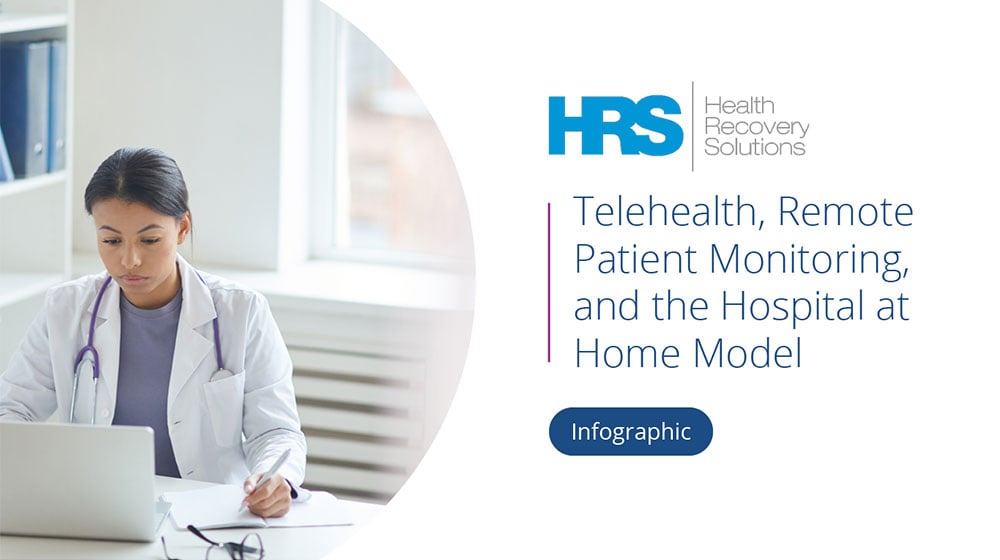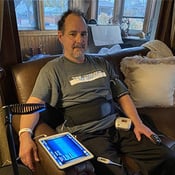Hospital at Home with HRS
Explore HRS’ library of Hospital at Home resources to learn how others have incorporated the model, insight into the patient and clinician experience, and program best practices and supporting research.
How HRS Can Help Power Hospital at Home Programs
Across the country, health systems are incorporating HRS remote patient monitoring and telehealth into their Hospital at Home programs. Our HRS solutions enable real-time biometric monitoring, including continuous remote monitoring, and improved provider-patient communication through virtual visits, symptom surveys, medication reminders, and more.
Common Targeted Illnesses for Hospital at Home Programs
- Acute pneumonia
- Cellulitis
- COVID-19
- UTI
- Dehydration
- Heart failure
- COPD
- Sepsis
- Post-Surgical
Hospital at Home Resources

5 Lessons Learned About Hospital at Home Programs
Health Recovery Solutions interviewed two Hospital at Home program leaders at Michigan Medicine and Allina Health who provided helpful insights into their Hospital at Home programs and shared their lessons for success.
Proven Outcomes with Hospital at Home
Reduced Readmissions
Decreased Length of Stay
Reduced Cost of Care
Improved Patient
Satisfaction and Experience
Diminished Hospital
Acquired Infections
Increased Revenue
from RPM/CCM
Reimbursement
We anticipated a swift and significant increase in patients and knew we needed to create a seamless process to ensure quality care. We involved provider groups and built a dedicated clinical telehealth team to keep open points of contact and streamline communication.
We came to the conclusion that patients don’t need to be in the hospital with technology like HRS. It allows us to care for them where they want to be, at home with their loved ones.
Hospital at Home programs are undoubtedly the care delivery model of the future…they leverage the highest quality technological capabilities available, [and offer] lower-cost, safe, high-quality hospital-level care in the home.
What is Hospital at Home?
Hospital at Home programs combine in-home and virtual visits with remote monitoring, offering patients timely, hospital-level care in their homes. In countries with single payer systems, this care model has long been considered effective at improving patient outcomes and reducing the total cost of care. Read our 5 Lessons Learned About Hospital at Home Programs white paper to learn more.
What conditions benefit from Hospital at Home?
Conditions that may benefit from this care model include acute pneumonia, cellulitis, COVID-19, urinary tract infection, dehydration, or exacerbations of chronic conditions, like heart failure or chronic obstructive pulmonary disease (COPD). In short, this care model offers patients who typically require hospitalization the option to receive acute-level care in their home.
Does HRS support continuous remote monitoring?
Yes! HRS recently announced the launch of its early adoption client program for continuous monitoring capabilities. This program—piloted by criteria-based clients—incorporates continuous body temperature, heart rate, respiratory rate, pulse oximetry and ECG metrics to further support healthcare organizations with high acuity patients.
Where did Hospital at Home start?
More than a decade ago, a pilot program launched at Johns Hopkins achieved savings of more than 30% per admission, while delivering equivalent outcomes and fewer complications than traditional hospital care. Since then, multiple studies have determined that, for some patients, the Hospital at Home model can be safer, cheaper, and more effective than care delivered in a hospital setting.
How can HRS help?
Across the country, health systems are incorporating HRS remote patient monitoring and telehealth into their Hospital at Home programs. For Hospital at Home programs, the HRS solution enables not only real-time biometric monitoring, but also provider-patient communication through virtual visits, symptom surveys, medication reminders, and more.
-1.jpg?width=445&height=200&name=HRSPatients-engagement%20(1)-1.jpg)







